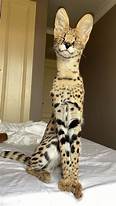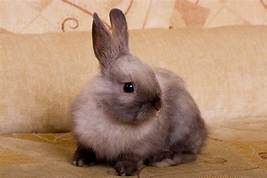Can a Serval Cat Be a Pet?
The serval, a wild cat native to Africa, captivates many with its striking appearance and sleek physique. Its large ears, spotted coat, and long legs contribute to its unique allure. Naturally, some people wonder if these fascinating creatures can become domesticated and serve as companion animals. However, determining whether serval cats can make suitable pets requires a comprehensive understanding of their inherent behaviors, needs, and the implications of keeping them in a domestic setting.

Temperament and Behavior
Serval cats exhibit a combination of wild and domesticated characteristics. They possess a natural curiosity and playful spirit, yet maintain a degree of independence and caution. While they may display affection towards their owners, serval cats are not inherently as affectionate as domesticated cats and tend to be more aloof. They also retain strong hunting instincts, which can result in chasing and capturing small prey, even within a household setting.
Additionally, serval cats exhibit a distinct vocalization pattern. They communicate through a variety of sounds, including meows, chirps, and hisses, and they tend to be more vocal than domesticated cats. These vocalizations can become disruptive in an urban or suburban environment.
Dietary Requirements
Serval cats have specialized dietary needs that can be challenging to meet in a domestic setting. They are obligate carnivores, meaning they require a diet consisting primarily of animal-based proteins. Providing a balanced and nutritious diet for a serval cat necessitates access to fresh, raw meat or high-quality meat-based cat food. This can be expensive and time-consuming to manage.
Furthermore, serval cats often engage in hunting and scavenging behaviors, even when provided with sufficient food. This can lead to the consumption of potentially harmful substances, such as insects, rodents, and other small animals, which may carry parasites or diseases.
Housing and Enrichment
Serval cats are highly active and require ample space to roam and explore. They thrive in environments that provide opportunities for climbing, running, and perching. A typical domestic home may not provide sufficient space for a serval cat to engage in its natural behaviors and maintain its physical and mental well-being.
Additionally, serval cats are highly intelligent and require mental stimulation to prevent boredom and destructive behaviors. Providing a variety of interactive toys, puzzle feeders, and other enrichment activities is essential for their overall well-being.
Legality and Safety
In many jurisdictions, the legality of keeping serval cats as pets is restricted or prohibited. Local laws and regulations vary, so it is crucial to thoroughly research and understand the legal implications of owning a serval cat in your area.
Furthermore, serval cats possess sharp claws and teeth, and they can inflict serious injuries if they feel threatened or stressed. Proper socialization and training are essential to minimize the risk of aggression, but even with careful handling, there remains an inherent risk associated with keeping a wild animal as a pet.
Conclusion
Ultimately, serval cats are not suitable pets for the vast majority of people. Their wild instincts, specialized dietary needs, housing requirements, and potential safety risks make them challenging and potentially dangerous companions. Keeping a serval cat as a pet is a significant undertaking that requires extensive knowledge, resources, and commitment. In most cases, it is in the best interest of the animal and the owner to appreciate the serval cat's beauty and majesty from afar, rather than attempting to domesticate it.
Declaration: All article resources on this website, unless otherwise specified or labeled, are collected from online resources. If the content on this website infringes on the legitimate rights and interests of the original author, you can contact this website to delete it.





